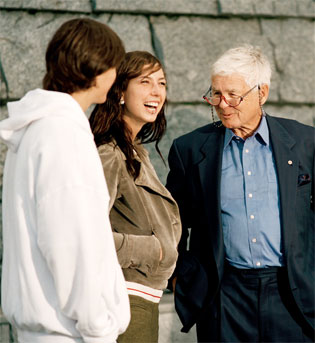

Investing in a New Generation - a New UBCIn 1945, a high school dropout named Irving K. Barber got an unexpected leg up from the Canadian government. Having served nearly five years as a pilot in the RCAF, the young husband and father was facing a post-war return to his job as a "parts boy" in the Edmonton Caterpillar dealership. Instead, he took advantage of a government offer to go to university, to finish his high school and earn a degree. "I chose Forestry -- because it looked easy and I didn't have to take Physics 100 -- and I came to UBC.
"It turned my thinking around." After a stunning career in the BC forest industry, culminating with the founding and development of Slocan Forest Products, Dr. Barber found that "I had accumulated some disposable income," and during the last five years he has set about finding the most creative and most productive way to effect that disposal. "During my career I worked in nearly every corner of the province, so I wanted to invest in things that provide a benefit to every corner of the province. My first gift was to the University of Northern British Columbia to establish an Enhanced Forest Products Laboratory, with the focus to grow trees faster and better in northern B.C. "My second gift was to the University of British Columbia for diabetes research, which sparked the creation of the Ike Barber Islet Transplant Laboratory, where people with insulin deficiencies could receive insulin-producing islet cell transplants. "The biggest gift came in response to (UBC President) Martha Piper's suggestion that I make a contribution, together with the Provincial government, to the creation of a new Learning Centre located at UBC. I was happy to see that the Centre would reach out to all British Columbians and the world. "At around the same time, I asked Martha what we were doing to make better citizens. We need to educate specialists, but we also need to be focusing on training and teaching people how to live with each other. And that's what led to the contribution to the (Irving K. Barber) School of Arts and Sciences at UBC Okanagan as well as the Interface Program located at the Irving K. Barber Learning Centre. We hope that by combining what are usually separate jurisdictions (Arts and Science) we might help to create better rounded students." The whole process of designing gifts and following up on their implementation ("It's in my nature to take a hands-on approach.") has provided Dr. Barber with something of a second career. It's also given him a hand in a major reform in the nature of post-secondary education in BC. "And does that give me satisfaction? The answer has to be, yes!" |
